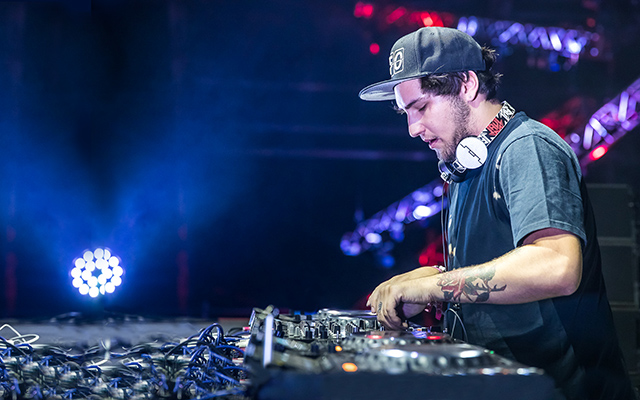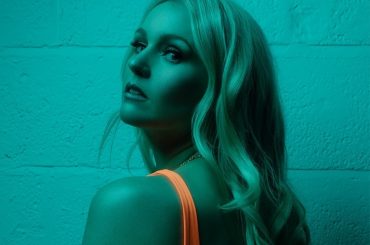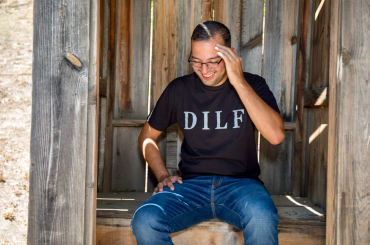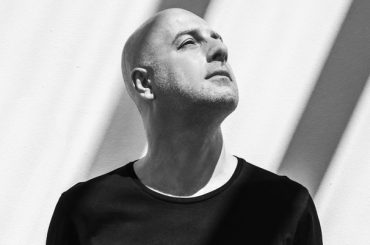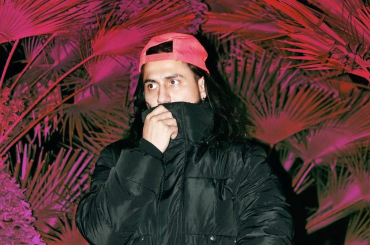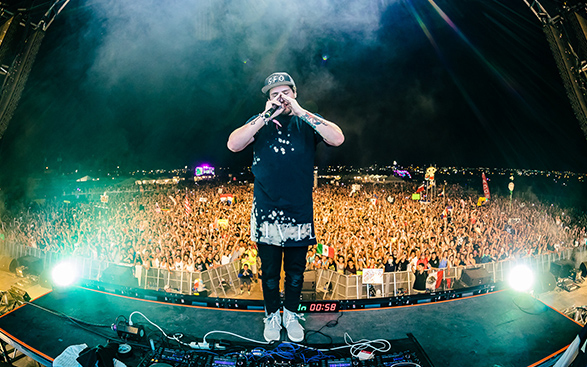
DJ Times: And he dropped it?
Vogel: His was one of the first sets we went to see that day since it was his first time in America. About halfway through the set, I heard the lead come in from “Feel The Volume” come in and I was like, “What the fuck is going on?” My girlfriend shoved me into the crowd. Man, I wish I had this video still—it’s literally a video of me barging through the crowd to the front of the stage, and the second I get to the front, the song drops, I turn around to see the crowd, and it’s just this fucking eruption. None of them had heard the track before. None of them. It hadn’t really picked up steam yet. It had gotten a couple hundred thousand plays on Soundcloud maybe. That was the first time I was like, “Oh shit, maybe we’re onto something.” It snowballed from there.
DJ Times: And it snowballed into touring with Borgore, right?
Vogel: I had been working with Buygore and [Borgore] for a while; my manager was on Buygore management when they picked me up. I had put out a lot of songs with them—they’re still family to this day—but “Feel The Volume” was actually supposed to be the first track of an EP I was going to do on Buygore. It just never really happened because the song did what it did [laughs]; I didn’t have time to plan an EP around it. We saw our moment. We either put out as much music as we can right now and capture that attention or it’s all going to go away.
DJ Times: What was the next move?
Vogel: From that point, there was about six, seven months where I didn’t play a single show. We turned down 45 show offers and just put out music, and built the hype up so when we finally did that Borgore tour, that was my “we’re going to start touring.” We had pushed me being a broke ass on a couch for as long as we possibly could. That was the turning point of being a bedroom producer, so to say. Even if people knew who I was, I had never really played a show.
DJ Times: So when did learning to DJ come into the mix?
Vogel: I was always a producer first and a DJ second. I lied [laughs], I [actually] did three whole shows in eight months. I did this one MySpace party with Borgore, and that was the first time I had ever DJed on CDJs. I practiced for like 24 hours beforehand. I had used controllers and I made music, so I understood counting to four and that kind of stuff, so once I figured out where all the buttons were, beatmatching and all that stuff came pretty naturally. When I did the tour with [Borgore], we did 28 or 30 shows in like a month and a half, so I went from barely knowing how to DJ—I didn’t know how to use any of the effects, any of the filters, nothing—to being really comfortable behind the decks. I went from never using the mic and thinking people would think I’m stupid for talking on a mic to really being able to be confident and get into it with the crowd. There are people who say I might talk on the mic a little too much now, but I’d rather be that than silent and shy.
DJ Times: Do DJing and production give back to each other?
Vogel: I try and keep them as separate as possible because I know that’s a very likely thing to have happen. I think it’s the natural curse in the progression of a producer-DJ’s life: the more shows you play, the more you want to hype the crowd, the more you see what works and want to write that kind of stuff. For me, it’s almost worked in the opposite way; I’ve felt like that for a while and then I’ve gotten it out of my system because it’s fucking stupid.
DJ Times: Why?
Vogel: I never wrote music for a live setting. There were even songs I wrote back in the day when I was coming up that I knew I would never play live—or at least not for a really long time until I have my own platform—and I know it’s something that’s not going to hype up a crowd, but it’s my music and it’s me and I want people to hear it. That they’re hearing it on SoundCloud is good enough for me; it doesn’t have to be a banger that the DJs are playing in the club. Back then, it was just I wanted people to hear what I had to say through my music—and I still do feel that—but it’s hard to remind yourself of that and not be like, “I should put this one out because it goes off in the club!” I’m getting to this point now where I can say what I want to say.
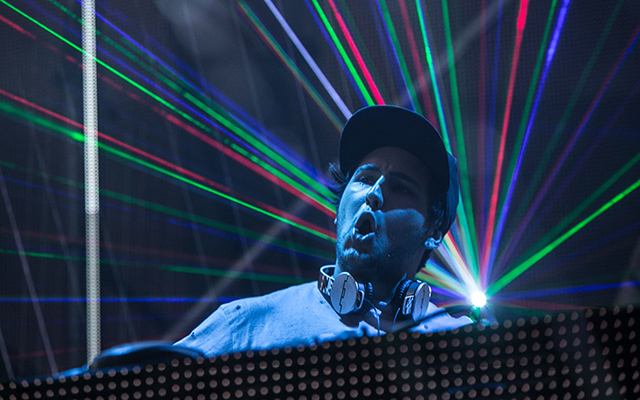
DJ Times: How’s that?
Vogel: There was a period of time after “Feel The Volume” and “Rock The Party” where I got a huge number of fans who knew me through those two songs. It was really hard to push something else on them when they’re like, “You’re the ‘Feel The Volume’ guy.” I never wanted to be that guy; I never wanted to be a one-genre one-trick-pony, so to speak. I think now finally—especially with all the music I’ve written and have sitting—I’m really getting to the point where I’m doing what I did at the beginning of when I started JAUZ that got me noticed not by a massive crowd, but enough to get picked up by management: whatever the fuck I wanted and not caring what anyone else said.
DJ Times: One of your signature production hallmarks is just how un-pigeonholeable you are. You’ve dipped from Future House and Bass House to trap and Big Room. What ties everything together?
Vogel: Honestly I don’t know, but it’s just the way that I write music. Before I was JAUZ, I wanted to make my music sound like other people’s music, and I could never do it. I could never get it to sound like them. I was like, “This doesn’t sound like this or that, so no one’s going to like it.” When I started being like, “Fuck it—it’s my music, if I’m happy with it that’s all that matters” and started putting out that music, that’s when I started to build that cohesiveness.
DJ Times: What is your preferred production setup?
Vogel: I’m on Ableton. I can use Logic and Reason and all the other ones, but I really don’t like to. At this point, I don’t know why you wouldn’t be on Ableton, but that’s just me. Since I started producing, I’ve only been on a laptop because, when I was first learning how to produce, I remember watching a video of Skrillex on a private jet flying to a show. He was sitting there working on new tunes on the plane, and then went and played it at the festival: “I wrote this on the plane over here!” I was like, that is so fucking cool, man, so I trained myself to be able to do that.
DJ Times: So that’s how you work, then?
Vogel: I always work from my laptop speakers and headphones. I never worry too much about studio monitors and whatever. When I did try to get into working in a studio, my production went to shit because I would sit there in the studio trying to make a kick drum sound good for literally—I shit you not—seven hours. Fuck this! If it sounds good on my laptop speakers and my headphones, I’ll play it on the monitors once or twice and, if the song sounds good, then I’m happy.
DJ Times: But you still work at home…
Vogel: Admittedly, I just built a gnarly PC tower that stays in my studio, like I just finished it yesterday. The thing is a fucking tank. It’s only because now when I’m home, this tower is here so that I can do all the really gnarly processing that might be too much for my laptop on the road, get all that shit out of the way, and then bring it back to my laptop so all I’m doing on my laptop is all the creative stuff.
DJ Times: Sounds like a bit of a paradigm shift.
Vogel: It’s something I’ve been debating for a long time, and I didn’t really want to have a system that was tied down somewhere that I couldn’t transport, so I spent a lot of time making sure that I could still be as portable as I have been. I think we figured out a pretty good solution.
DJ Times: What’s the key to working with someone, especially if you might not know them that well to begin with?
Vogel: I would say that right there is the key – you should probably get to know them. I’ve had a lot of studio sessions where I go in with someone I don’t know, and we spend more time just talking and hanging around than working on music. If we sit there and just try to work, both people think whatever they’re going to do to the track the other person is going to think is stupid, so neither of you wants to go too far down the rabbit hole. Whenever I’ve tried to do that, it’s never worked, so now what I do when I’m working with someone I don’t know is go into a studio session completely expecting us to make no music. Just hang out, dick around, get to know each other, have fun, and if music gets made, cool. If not, then we’ll work on it on our own, send it back and forth, and now we’re comfortable with each other we have that communication, and then when we get back in the studio we’ll finish it up.
DJ Times: It’s worth noting that you’re part of this “next generation” of electronic artists who are playing to kids that may have never stepped foot in a club in their lives. Do you think there’s something tying your rise and festival culture together?
Vogel: That’s a good question. I think whether it was festival culture or underground shows that were all ages, it was just a natural progression that was going to happen because there’s a new generation of kids coming in. I think it’s more that those same kids have migrated to the festivals and all of the festivals started doing so well that more of them popped up than just the festivals bringing out those kids. Maybe it’s a little bit of both, but I think regardless of all that, my music got out to people not because of festivals, but because of the internet.
DJ Times: You’ve got DJ residencies in San Diego and Las Vegas at Hakkasan and Omnia. Are your sets at those clubs different than what you might play at something like Ultra Miami?
Vogel: I always say that they are, but then they end up being very close to each other. The difference is when you’re playing a big club, a lot of those people—even if they’re going because my name is on the billboard—might not know what I’m about or who I am. It’s been fun for me to have that challenge of figuring out tying in the shit that I really love to making random clubgoers and also really rich people who are spending hundreds of thousands of dollars on tables have a good time. It’s nerve-wracking. It’s a big honor to be considered someone who can do something like that, but it’s also definitely out of my wheelhouse and my comfort zone.
DJ Times: What’s the progression been like for you?
Vogel: I’ve become a really good DJ since I started in Vegas. My normal festival set, I’ll know what songs I’m going to play; I’ll have 50-80 songs in a playlist and run through them. When I’m in Vegas, I’ll have a 300-400 song playlist. I start at one point and I have no idea where I’m going to go from there. I’ll feel out the crowd. Outside of Vegas at clubs and festivals, if [attendees] aren’t there to see me, I’ll do my thing. I’m going to do exactly what I want. I look at it like if I was a metal band: I’m not going to change my setlist because some kid wants to hear whatever. I’m there to play my setlist, my tracks—I’m going to play it. However, Vegas is where you have to be a real DJ. It’s been fun to go that far outside of what I’m comfortable with, and I can now do it.


